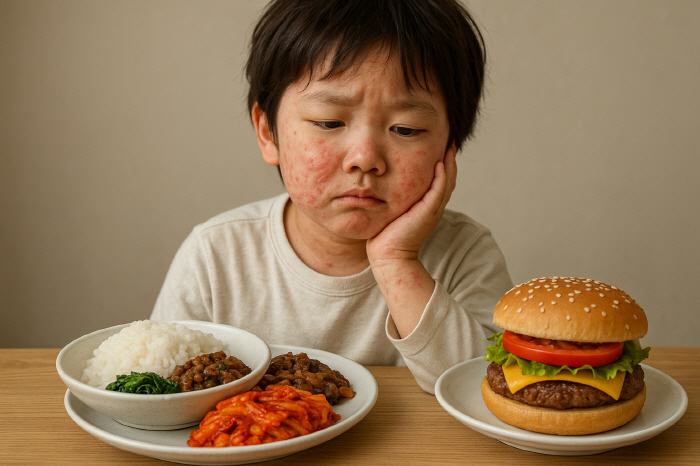It is less itchy than children with atopic dermatitis who eat mainly Korean food and children who eat snacks and processed foods
|
This is the result of a research team led by Professor Kim Hye-mi of the Department of Food and Nutrition at Pusan National University, and Professor Lim Chi-hyun of Industrial Engineering at the Ulsan Institute of Science and Technology (UNIST), published in the international journal `Pediatric Allergy and Immunology.'
The research team divided 75 preschool children (24 atopy dermatitis, 51 healthy children) between the ages of 3 and 6 into meals, such as rice, soup, stew, and side dishes commonly eaten at home, and snacks, such as donuts, cakes, ramen, pizza, and hamburgers. Based on the Food Frequency Questionnaire, children's dietary patterns and preferences were evaluated by the contents written by the guardian and the food that the parents remembered and wrote down.
As a result of the study, children who eat mainly Korean food had 1.75 points of itching that interfered with sleep, but children with a snack-oriented diet were twice as high as 3.5 points.
In the quality of life evaluation (CDLQI, Children's Dermatology Life Quality Index, the higher the score, the more adverse the quality of life) used by pediatric dermatologists, children with Korean food-oriented diets scored 2.34 points and children with snack-oriented diets scored 7.25 points.
The research team believes that these results are related to the 'gut-skin axis' theory that intestinal and skin health are closely related. It is interpreted that the food consumed is likely to have worsened atopic dermatitis symptoms by causing changes in intestinal microorganisms.
In the intestines of children who enjoy snacks rather than actual rice, certain microorganisms called Dorea and Anaerostipes increased, and the itching was found to be worse in them. On the other hand, in the intestines of children who ate mainly Korean food and those who did not have atopic dermatitis, Oscillibacter, known as beneficial bacteria, was more abundant. There was a tendency for itching to be relieved in children with many ochreibacter.
Professor Minyoung Jung should provide customized nutritional care according to the child's developmental stage and preference, rather than indiscriminately restricting eggs, milk, etc. to children with atopic dermatitis without consultation with a specialist."This study could serve as basic data for preparing dietary strategies for diseases."
This article was translated by Naver AI translator.




